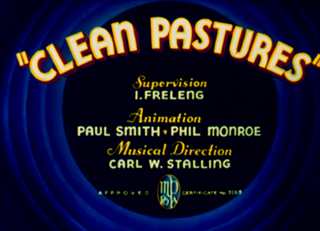
Lincoln Theodore Monroe Andrew Perry, better known by the stage name Stepin Fetchit, was an American vaudevillian, comedian, and film actor of Jamaican and Bahamian descent, considered to be the first black actor to have a successful film career. His highest profile was during the 1930s in films and on stage, when his persona of Stepin Fetchit was billed as the "Laziest Man in the World".
1913 was a particularly fruitful year for film as an art form, and is often cited one of the years in the decade which contributed to the medium the most, along with 1917. The year was one where filmmakers of several countries made great artistic advancements, producing notable pioneering masterpieces such as The Student of Prague, Suspense, Atlantis, Raja Harischandra, Juve contre Fantomas, Quo Vadis?, Ingeborg Holm, The Mothering Heart, Ma l’amor mio non muore!, L’enfant de Paris and Twilight of a Woman's Soul.
The year 1912 in film involved some significant events.
The year 1911 in film involved some significant events.
The year 1908 in film involved some significant events.

Clean Pastures is a 1937 Warner Bros. Merrie Melodies cartoon directed by Friz Freleng. The short was released on May 22, 1937.

Show Boat is a 1929 American pre-Code sound part-talkie romantic drama film based on the 1926 novel Show Boat by Edna Ferber. The film initially did not use the 1927 stage musical of the same name as a source, but scenes were later added into the film incorporating two of the songs from the musical as well as other songs. Many of these songs from the stage show were featured in a special prologue that was added to the picture before it was released. This film was produced and released by Universal. Like the majority of films during the early sound era, a silent version was made for movie theatres that had not yet converted to sound.

The Cat and the Canary is a 1927 American silent comedy horror film directed by Paul Leni. An adaptation of John Willard's 1922 black-comedy play of the same name, the film stars Laura La Plante as Annabelle West, Forrest Stanley as Charlie Wilder, and Creighton Hale as Paul Jones. The plot revolves around the death of Cyrus West, who is Annabelle, Charlie, and Paul's uncle, and the reading of his will twenty years later. Annabelle is revealed as the heir, but she and the other guests must still face a night in his haunted mansion. The plot thickens when they are informed that a lunatic known as the Cat has escaped from an asylum and is hiding in the house.

The Last Performance is a 1929 American sound part-talkie film directed by Paul Fejos and starring Conrad Veidt and Mary Philbin. In addition to sequences with audible dialogue or talking sequences, the film features a synchronized musical score and sound effects along with English intertitles. The soundtrack was recorded using the Western Electric sound-on-film system. The talking sequences were featured on the last reel.

William Best, known professionally as Willie Best or Sleep 'n' Eat, was an American television and film actor.

The Galloping Ghost is a 1931 American pre-Code Mascot serial film co-directed by B. Reeves Eason and Benjamin H. Kline. The title is the nickname of the star, real life American football player Red Grange. Serial historian Raymond William Stedman lists Lon Chaney Jr. as appearing in Ghost in a small uncredited part as a henchman, but this has never been verified.

Big Time is a 1929 American pre-Code film starring Lee Tracy and Mae Clarke as a show business couple who break up over his infidelity. This was Clarke's film debut. Director Kenneth Hawks was Howard Hawks' brother.

Judge Priest is a 1934 American comedy film starring Will Rogers. The film was directed by John Ford, produced by Sol M. Wurtzel in association with Fox Film, and based on humorist Irvin S. Cobb's character Judge Priest. The picture is set in post-reconstruction Kentucky and the supporting cast features Henry B. Walthall, Hattie McDaniel and Stepin Fetchit. It was remade by Ford in 1953 as The Sun Shines Bright.

The Unholy Night is a 1929 American pre-Code mystery film directed by Lionel Barrymore and starring Ernest Torrence.
"The Lonesome Road" is a 1927 song with music by Nathaniel Shilkret and lyrics by Gene Austin, alternately titled "Lonesome Road", "Look Down that Lonesome Road" and "Lonesome Road Blues." It was written in the style of an African American folk song.

Fox Movietone Follies of 1929, also known as Movietone Follies of 1929 and The William Fox Movietone Follies of 1929, is an American black-and-white and color pre-Code musical film released by Fox Film Corporation.

Horace Murphy was an American film actor. He appeared in more than 120 films between 1931 and 1953.

The Old Chisholm Trail is a 1942 American Western film written and directed by Elmer Clifton. The film stars Johnny Mack Brown, Tex Ritter, Fuzzy Knight, Jennifer Holt, Mady Correll and Earle Hodgins. The film was released on December 11, 1942, by Universal Pictures.

War Correspondent is a 1932 American drama film directed by Paul Sloane. The film stars Jack Holt, Ralph Graves and Lila Lee. Although set in war-torn China, War Correspondent was entirely shot in California.

Neck and Neck is a 1931 American pre-Code drama film directed by Richard Thorpe from a script by Betty Burbridge and starring Glenn Tryon, Vera Reynolds and Walter Brennan.
















